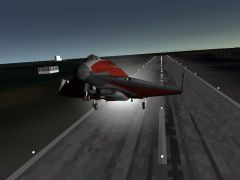Delta-glider
| Delta-glider | |
|---|---|

| |
| Delta-glider in atmosphere | |
| Description | |
| Role | Glider |
| Full name | Delta-glider |
| Crew | 1 |
| Passengers | 4 |
| First flight | date unknown |
| Entered service | date unknown |
| Manufacturer | unknown |
| Dimensions | |
| Length | 17.76 m |
| Height | 4.93 m |
| Wingspan | 17.86 m |
| Wing area | 160 m2 |
| Masses | |
| Empty | 12,000 kg |
| Fuel | 14,400 kg |
| RCS fuel | 600 kg |
| Max. take-off | 27,000 kg |
| Inertia PMI | 15.5 / 22.1 / 7.7 m2 |
| Performance | |
| Max. delta-v | 31.5 km/s |
| Max. accel | 20 m/s2 |
| Stall CL | 1.0 |
| Stall AOA | 20° |
The Delta-glider is the ideal Template:noun for the novice Template:noun to get spaceborne. Its futuristic Template:noun Template:noun, high Template:noun and extremely low fuel consumption make it easy to achieve Template:noun, and it can even be used for interplanetary Template:noun. The winged design provides Template:noun-like handling in the lower atmosphere, while the vertically mounted hover-Template:noun plural allow vertical Template:noun plural and Template:noun plural independent of atmospheric conditions and Template:noun plural.
It comes with the stock Orbiter Template:noun.
The scramjet variant, Deltaglider-S, splits its main fuel Template:noun into 10,400kg for the main Template:noun plural and 4,000kg for the scramjets. Their effective operating Template:noun is Mach 3-8.